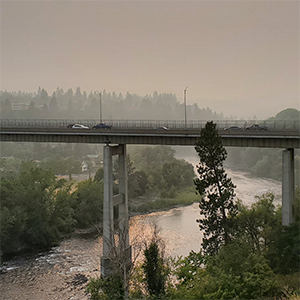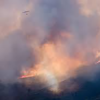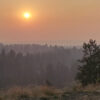
Air Quality “Unhealthy for Sensitive Groups” Due to Wildfire Smoke
Media Contact: Kelli Hawkins, SRHD | khawkins@srhd.org | 509.324.1539, c 509.994.8968
SPOKANE, Wash. – Wildfire smoke from area wildfires may affect air quality today through Thursday, reaching the “Unhealthy for Sensitive Groups” range of the air quality index (AQI), according to Spokane Regional Clean Air Agency (Spokane Clean Air).
As of 10:35 a.m. today, AQI is at 132, in the “Unhealthy for Sensitive Groups” range. An increase in fine particulate (PM-2.5) levels, resulting in higher AQI, is expected over the next two days due to high pressure producing warm dry conditions today with very little wind, trapping smoke from multiple wildfires and prescribed fires in the region. A weak weather disturbance should bring a few clouds and light wind tomorrow, but conditions will be slow to improve as shifting winds begin to transport smoke from the Cascades to the east. Although conditions could improve somewhat later in the day, changing winds and fire activity may cause AQI to reach the Unhealthy for Sensitive Groups range at times. At this range, sensitive groups are at high risk of more serious health affects due to exposure. Spokane Regional Health District (SRHD) provides guidance on how to stay healthy when air quality is poor.
Stay Aware of the Air Quality Range & Plan Accordingly
Please visit www.spokanecleanair.org for hourly updates on the air quality levels. Statewide air quality information is also available at Washington Smoke Blog.
According to L&I’s Emergency Wildfire Smoke Rule, employers are required to take steps to limit workers’ exposure to smoke when smoke particulates, known as PM2.5, reach certain levels.
Visit L&I’s website to learn more.
Sensitive groups include people most likely to have health problems from breathing smoke:
- Persons with, or recovering from, COVID-19
- People with lung diseases (asthma, COPD, bronchitis, emphysema)
- People with respiratory infections
- People with existing heart or circulatory problems
- People with a prior history of heart attack or stroke
- Infants and children under 18
- Older adults (over age 65)
- Pregnant women
- People who smoke
- People with diabetes
Those Considered Sensitive Should Stay Indoors
- Reduce the amount of time spent outdoors. Avoid vigorous outdoor activities.
- SRHD provides a guide for School Activities and Outdoor Sporting Events to help navigate decisions based on air quality. The same guide could be used by businesses or for private gatherings. It is located at srhd.org/air-quality-wildfire-faq, under Resources.
- If one must be outside, it is advised to wear a properly fitted N95 mask, not fabric or surgical masks. See SRHD’s resource on how to put on an N95 correctly.
- Clean air spaces can be found at local libraries, malls and movie theaters.
- Keep indoor air as clean as possible. Keep windows and doors closed. Use a high-efficiency particulate air (HEPA) filter to reduce indoor air pollution. Make a do-it-yourself box fan filter. Avoid smoking tobacco, using woodburning stoves or fireplaces, burning candles, incenses or vacuuming. See “How to Create a Clean Room” guidance.
- Listen to your body and contact your healthcare provider or 911 if you are experiencing health symptoms.
- Check on family and friends, especially those in sensitive groups. Provide a clean air space for them if needed.
For more information and resources on wildfire smoke and your health:
- Spokane Regional Health District Wildfire Smoke
- Spokane Regional Clean Air Agency Wildfire Smoke
- Statewide smoke and fire information
- L&I Wildfire Smoke Requirements & Policies
About Spokane Regional Health District
Spokane Regional Health District is a leader and partner in public health by protecting, improving and promoting the health and well-being of all people through evidence-based practices. SRHD is one of 34 local public health agencies serving Washington state’s 39 counties. Visit www.srhd.org for comprehensive, updated information about SRHD and its triumphs in making Spokane a safer and healthier community. Like SRHD on Facebook or follow us on Twitter to receive safety and wellness tips.
About Spokane Clean Air
Our job is to ensure that people in Spokane County have clean air to breathe. We monitor air quality for
key pollutants to know how clean the air is and where to focus our resources. We implement programs to improve air quality; we enforce federal, state, and local air quality laws; and we encourage individuals to make clean air choices.



